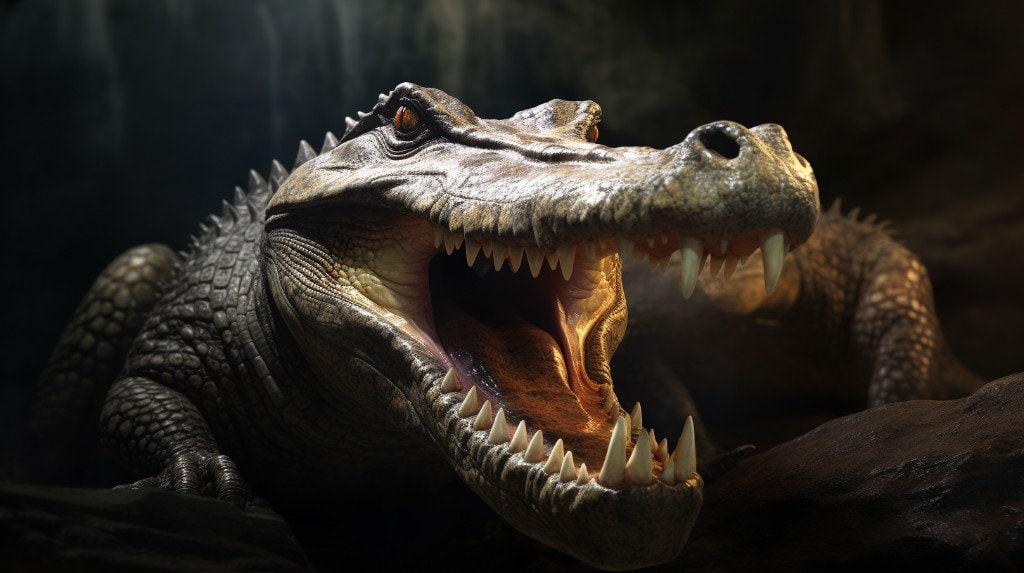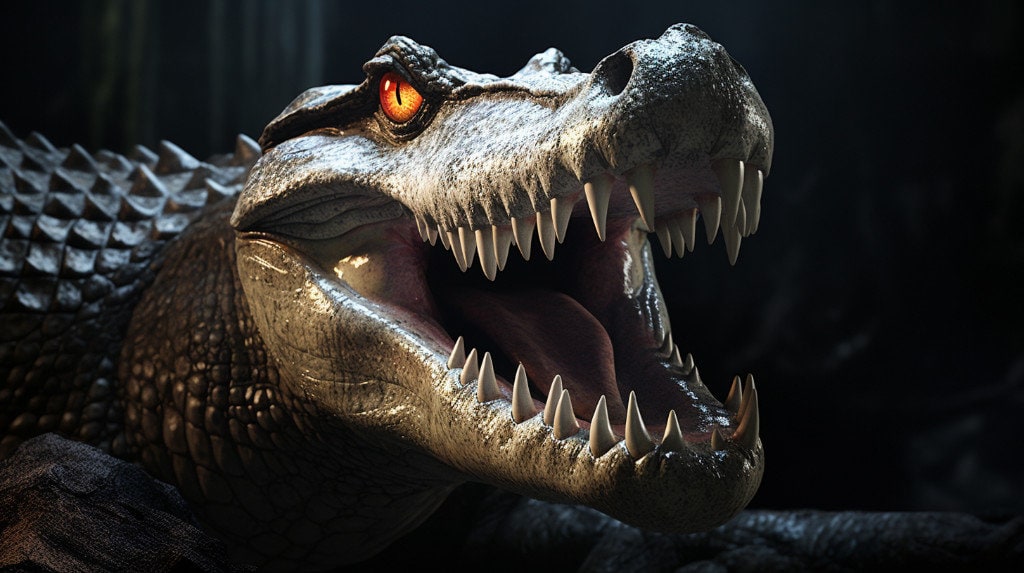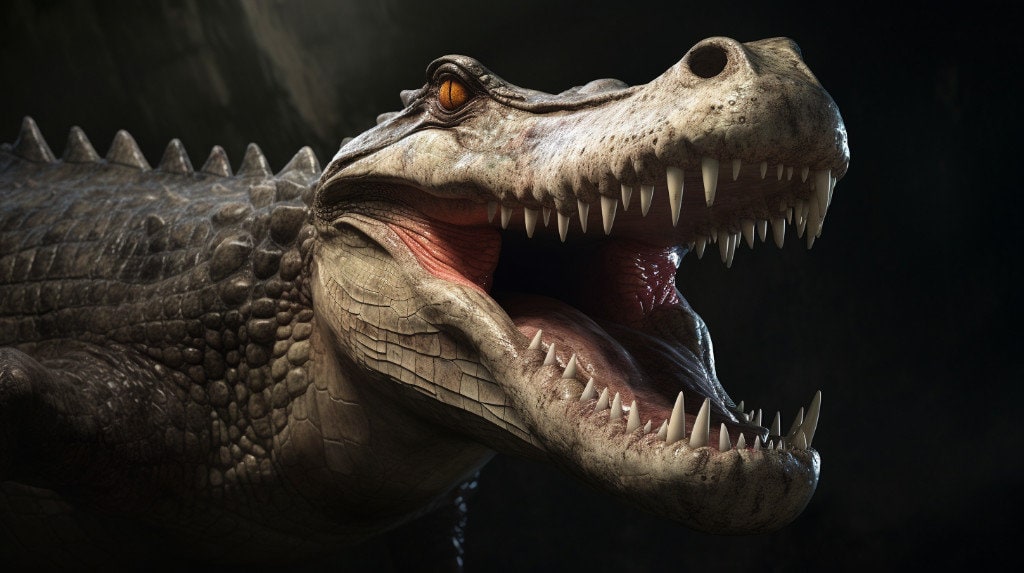Crocodiles are fascinating creatures that have been around for millions of years. One interesting aspect of these reptiles is their teeth. Have you ever wondered how many teeth a crocodile has? Well, the answer might surprise you. On average, a crocodile can have anywhere between 60 to 110 teeth in its mouth. These teeth are not only numerous but also sharp and powerful, allowing crocodiles to catch and tear apart their prey. To give you a better idea, here are some key takeaways about the number of teeth in a crocodile:
| Crocodile Species | Number of Teeth |
|---|---|
| Nile Crocodile | 60-72 |
| Saltwater Crocodile | 64-68 |
| American Crocodile | 66-68 |
| Morelet’s Crocodile | 66-72 |
Key Takeaways:
- Crocodiles can have anywhere between 60 to 110 teeth.
- The number of teeth can vary depending on the species.
- Nile crocodiles typically have 60-72 teeth.
- Saltwater crocodiles usually have 64-68 teeth.
- American crocodiles have 66-68 teeth.
- Morelet’s crocodiles have 66-72 teeth.
Now you have a better understanding of how many teeth a crocodile can have. It’s just one of the many fascinating aspects of these ancient reptiles.
Understanding Crocodile Dentition
Crocodile dentition refers to the dental structure and arrangement of teeth in crocodiles, which is unique and fascinating. Crocodiles are reptiles known for their powerful jaws and sharp teeth, making them formidable predators in their natural habitats. Let’s delve into the overview of crocodile teeth and explore the unique dental structure of these incredible creatures.
Overview of Crocodile Teeth
Crocodiles have a remarkable tooth count, with an average of 64 to 68 teeth in their mouth at any given time. However, the number of teeth can vary depending on the species and age of the crocodile. Unlike humans, crocodiles have the ability to continuously grow new teeth throughout their lives. This is an essential adaptation that allows them to replace damaged or worn-out teeth.
Crocodile teeth are cone-shaped and well-suited for their predatory lifestyle. The teeth are designed to grasp and hold onto prey, preventing it from escaping. The tooth anatomy of crocodiles consists of sharp, interlocking teeth that fit together perfectly when the mouth is closed. This arrangement ensures a secure grip on prey, making it difficult for the prey to escape.
The Unique Dental Structure of Crocodiles
The dental characteristics of crocodiles are fascinating. Crocodile teeth are embedded in sockets within the jawbone, and they are anchored by a specialized type of tissue called a gomphosis joint. This joint allows the teeth to be firmly attached to the jaw while still allowing for some flexibility.
Crocodiles have two sets of teeth: one set for capturing and holding prey, and another set for crushing and tearing. The teeth in the front of the mouth are sharp and pointed, ideal for gripping and puncturing the prey. Towards the back of the mouth, the teeth are broader and flatter, enabling them to exert tremendous force when crushing and tearing apart their prey.
The bite force of a crocodile is incredibly powerful. It has been estimated that a crocodile’s bite force can reach up to 5,000 pounds per square inch (psi). This immense force allows crocodiles to capture and subdue large prey, such as wildebeests or zebras, with relative ease.
Interestingly, there are some differences between the teeth of crocodiles and alligators. While both reptiles have a similar tooth count, the shape and arrangement of their teeth differ slightly. Alligator teeth are more rounded, while crocodile teeth are more pointed. Additionally, the fourth tooth on the lower jaw of an alligator is visible even when the mouth is closed, whereas in crocodiles, it is hidden.
In terms of dental health, crocodiles have a remarkable ability to maintain their teeth in good condition. The cells in their gums are capable of producing new teeth to replace any that are lost or damaged. This continuous tooth replacement ensures that crocodiles always have a full set of functional teeth for hunting and feeding.
In conclusion, crocodile dentition is a fascinating aspect of these reptiles’ biology. Their tooth anatomy, tooth replacement, and unique dental structure contribute to their success as apex predators. The specialized teeth and powerful bite force of crocodiles make them formidable hunters in their aquatic habitats.
The Number of Teeth in a Crocodile
Crocodile dentition is a fascinating topic that sheds light on the unique dental structure of these reptiles. Crocodiles have a remarkable number of teeth, which play a crucial role in their survival and hunting strategies. Let’s explore the tooth count in both baby and adult crocodiles.
How Many Teeth Does a Baby Crocodile Have?
When it comes to the number of teeth in a baby crocodile, it’s quite impressive. These young reptiles are equipped with a set of teeth that helps them navigate their early stages of life. On average, a baby crocodile has around 64 teeth in its mouth. These teeth are small and sharp, allowing them to catch and grip onto prey effectively.
Crocodile tooth replacement is an intriguing process. As baby crocodiles grow, their teeth start to wear down or fall out due to their hunting activities. However, crocodiles have a unique ability to continuously grow new teeth throughout their lives. This tooth replacement mechanism ensures that they always have a functional set of teeth to capture their prey.
How Many Teeth Does an Adult Crocodile Have?
As crocodiles mature into adulthood, their tooth count increases significantly. An adult crocodile can have up to 60 teeth in its mouth at any given time. These teeth are larger and more robust compared to the ones found in baby crocodiles. The tooth arrangement in reptiles like crocodiles is designed to accommodate their powerful bite force.
Crocodile jaws are incredibly strong, capable of exerting immense pressure on their prey. With an average bite force of around 5,000 pounds per square inch (lbf), crocodiles can capture and drag their prey into the water effortlessly. This formidable jaw strength, combined with their numerous teeth, allows them to overpower and consume a wide range of animals.
It’s interesting to note that there are slight variations in tooth count between male and female crocodiles. On average, female crocodiles tend to have slightly fewer teeth than males, with around 56 teeth. However, these differences are minimal and do not significantly impact their hunting capabilities.
In comparison to their close relatives, alligators, crocodiles have a higher tooth count. Alligators typically have around 74 to 80 teeth in their mouths. This disparity in tooth numbers reflects the subtle differences in the dental characteristics of crocodiles and alligators.
Crocodile dental health is essential for their survival. The teeth of these reptiles are well-adapted to their predatory lifestyle, with sharp edges and a strong structure. However, like any other living organism, crocodiles can experience dental issues such as tooth decay or gum disease. These conditions can affect their ability to catch and consume prey efficiently.
In conclusion, crocodiles possess an impressive number of teeth that contribute to their survival and hunting prowess. From the small and sharp teeth of baby crocodiles to the larger and more robust teeth of adults, these reptiles are well-equipped to capture and consume their prey. The tooth anatomy of crocodiles, along with their powerful jaws, allows them to maintain their dominance in their natural habitats.
Variations in Crocodile Teeth Count

Crocodile dentition is a fascinating topic that showcases the unique dental structure of these reptiles. The tooth count in different species of crocodiles can vary, offering insights into their hunting and feeding behaviors. Let’s explore the teeth count in various species of crocodiles and delve into the intriguing world of crocodile dental characteristics.
Teeth Count in Different Species of Crocodiles
Crocodiles possess a remarkable tooth arrangement in their jaws, which allows them to efficiently capture and consume their prey. The number of teeth in a crocodile’s mouth can vary depending on the species and age of the individual. While the exact tooth count may differ, the general pattern remains consistent.
In most crocodile species, an adult crocodile typically has around 64 to 68 teeth in their mouth at any given time. However, it’s important to note that this number can change due to tooth replacement. Crocodiles continuously grow new teeth to replace the old ones, ensuring their dental health and functionality.
The tooth replacement process in crocodiles is intriguing. When a tooth is lost or damaged during a hunt, a new tooth begins to grow from a specialized tooth cell located within the gum. This replacement process happens quite rapidly, with a new tooth emerging soon after the loss of the old one. This ability to quickly regenerate teeth is vital for crocodiles, especially when they rely on their powerful jaws to catch and consume prey.
Interestingly, the tooth count in crocodiles differs between males and females. Female crocodiles tend to have fewer teeth compared to their male counterparts. On average, a female crocodile may have around 60 teeth, while a male crocodile can have up to 70 teeth. This difference in tooth count between genders is thought to be related to the size and strength of the jaws, as males often require more teeth to exert greater force when capturing prey.
When it comes to the bite force of crocodiles, it is truly impressive. These reptiles have one of the strongest bite forces in the animal kingdom. A crocodile‘s bite force can range from 3,700 to 5,000 pounds per square inch (psi). This immense power allows them to capture and subdue their prey with ease, making them formidable predators in their natural habitats.
In comparison to crocodiles, alligators have a slightly different tooth count. Alligators typically have fewer teeth than crocodiles, with an average tooth count of around 74 to 80. Despite this difference, both crocodiles and alligators share similar dental characteristics and rely on their teeth for hunting and feeding.
In conclusion, the variations in crocodile teeth count provide valuable insights into the dental anatomy and characteristics of these fascinating reptiles. From their tooth replacement process to the differences in tooth count between genders, crocodiles showcase remarkable adaptations that contribute to their survival and success as apex predators.
The Lifespan of Crocodile Teeth

How Many Teeth Does a Crocodile Have in Its Lifetime?
Crocodile dentition is a fascinating aspect of their biology. These reptiles have a unique tooth replacement system that allows them to continuously grow new teeth throughout their lives. Unlike humans, crocodiles do not have a fixed number of teeth. Instead, they have a tooth arrangement that enables them to replace old or damaged teeth with new ones.
At any given time, a crocodile can have up to 80 teeth in its mouth. However, over its lifetime, a crocodile can go through multiple sets of teeth. As one tooth is lost or worn down, a new tooth grows to take its place. This continuous replacement process ensures that the crocodile always has a full set of functional teeth for hunting and feeding.
The tooth replacement in crocodiles is a remarkable adaptation. When a tooth is lost, a specialized dental cell in the crocodile’s gum called a “dental lamina” triggers the growth of a new tooth. This process happens relatively quickly, with a new tooth emerging within a few weeks. The new tooth then moves forward to replace the old one, ensuring a seamless transition.
How Many Teeth Can a Crocodile Have Over Its Lifetime?
The number of teeth a crocodile can have over its lifetime depends on various factors, including its age and overall dental health. Young crocodiles tend to have fewer teeth compared to adults. As they grow, their tooth count increases, and they develop a more extensive dental structure.
On average, a female crocodile can have around 60 to 70 teeth in its mouth at any given time. In contrast, male crocodiles may have slightly fewer teeth, typically around 50 to 60. However, it’s important to note that these numbers can vary among individuals and species.
Crocodiles use their teeth for various purposes, including capturing and holding onto prey. Their jaw muscles are incredibly powerful, allowing them to exert tremendous force when biting down on their prey. The bite force of a crocodile can range from 3,700 to 5,000 pounds per square inch (psi), making it one of the strongest bites in the animal kingdom.
In comparison to alligators, crocodiles have a more prominent tooth display when their mouths are closed. This is because some of their teeth on the lower jaw are visible even when the mouth is shut. Alligators, on the other hand, have a more concealed tooth arrangement, with only the upper teeth visible when their mouths are closed.
In conclusion, the lifespan of crocodile teeth is a dynamic process of growth and replacement. Crocodiles continuously develop new teeth throughout their lives, ensuring they always have a formidable set of dental weapons. The number of teeth a crocodile can have over its lifetime varies, but they can have up to 80 teeth in their mouth at any given time. This remarkable dental adaptation allows crocodiles to thrive in their natural habitats and maintain their predatory prowess.
Comparing Crocodile and Alligator Teeth

Crocodiles and alligators are fascinating reptiles known for their powerful jaws and sharp teeth. Let’s take a closer look at their dental structures and compare the number and arrangement of their teeth.
How Many Teeth Do Alligators Have?
Alligators have a remarkable number of teeth in their mouths. On average, an adult alligator can have between 74 to 80 teeth at any given time. However, it’s important to note that the number of teeth can vary depending on the size and age of the alligator.
How Many Rows of Teeth Do Alligators Have?
Unlike humans who have only two sets of teeth in their lifetime, alligators have a unique tooth replacement system that allows them to continuously grow new teeth. They have multiple rows of teeth in their jaws, with each row containing around 15 to 20 teeth. As the alligator loses or wears down a tooth, a new one grows in its place. This tooth replacement process ensures that the alligator always has a fresh set of teeth to use for hunting and feeding.
The tooth arrangement in reptiles like crocodiles and alligators is quite fascinating. The teeth are not evenly spaced but rather interlock when the mouth is closed. This arrangement helps prevent prey from escaping and provides a secure grip when capturing and holding onto prey.
Crocodiles, similar to alligators, have a high tooth count and multiple rows of teeth. The number of teeth in a crocodile’s mouth can range from 60 to 110, depending on the species and size of the individual. The tooth anatomy of crocodiles is designed to suit their predatory lifestyle, with sharp, conical teeth at the front for gripping and tearing prey, and larger, more robust teeth towards the back for crushing and grinding.
In terms of dental characteristics, both crocodiles and alligators have strong, durable teeth that are well-suited for their carnivorous diet. Their teeth are anchored in sockets within the jawbone and are held in place by a specialized type of connective tissue called the periodontal ligament. This ligament allows for some flexibility, which is essential when the reptiles bite down with tremendous force to capture and subdue their prey.
When it comes to bite force, crocodiles have been found to have a stronger bite than alligators. Studies have shown that the bite force of a crocodile can range from 3,700 to 5,000 pounds per square inch (psi), while alligators have a bite force of around 2,900 psi. This immense bite force allows crocodiles to capture and hold onto their prey, making them formidable predators in their habitats.
In conclusion, both crocodiles and alligators have impressive dental structures that enable them to thrive in their environments. Their teeth, with their unique replacement system and specialized arrangements, play a crucial role in their hunting and feeding behaviors. Understanding the dental health and characteristics of these reptiles provides valuable insights into their biology and evolutionary adaptations.
Conclusion
In conclusion, crocodiles are known for their impressive dental arsenal. These ancient reptiles have a mouthful of teeth, with the exact number varying depending on the species and size of the crocodile. On average, a crocodile can have between 60 to 110 teeth in its mouth at any given time. However, what makes crocodile teeth truly fascinating is their ability to continuously replace lost or damaged teeth throughout their lifetime. This remarkable adaptation ensures that crocodiles always have a formidable set of teeth for hunting and devouring their prey. So, next time you encounter a crocodile, remember to admire its powerful jaws and the multitude of teeth that lie within.
Frequently Asked Questions
How many teeth can a crocodile have?
A crocodile can have up to 80 teeth in its mouth at any given time.
How many teeth does a crocodile have in its lifetime?
Throughout its life, a crocodile can grow and replace as many as 8,000 teeth.
How many teeth does a baby crocodile have?
A baby crocodile typically has around 40 teeth, with more growing as they mature.
How many teeth do saltwater crocodiles have?
Saltwater crocodiles, like other species, usually have between 60 and 70 teeth.
How many teeth do alligators have?
Alligators have between 74 and 80 teeth, similar to their crocodile cousins.
How many teeth does a Nile crocodile have?
A Nile crocodile typically has between 64 and 68 teeth.
How many teeth can a crocodile have over its lifetime?
A crocodile can replace each of its 80 teeth up to 50 times in its lifetime, potentially leading to a total of 4,000 teeth over a lifespan.
How many teeth does a croc have?
A “croc“, or crocodile, has up to 80 teeth in its mouth at one time.
How many teeth do saltwater crocodile have?
Saltwater crocodiles typically have between 60 and 70 teeth.
How many teeth does a saltwater crocodile have?
Just like other crocodile species, a saltwater crocodile usually has between 60 and 70 teeth.




